It’s amazing; some of the guitars I have seen come in for repair when all they really needed was a new set of strings. If you are wondering “why change guitar strings” unless you absolutely have to, then you need to read this article.
Playing on an old and worn-out set of strings is one of the most common mistakes that beginning guitar players make. However, you don’t have to spend a lot of money to replace your guitar strings, and it’s pretty easy to do.
Check out what I have to say to find out why changing your strings can make a huge difference in how you play and sound.
Does Changing Guitar Strings Really Make A Difference, And Why?
The short answer is “yes,” but why is more involved and requires some explanation.
Ask any guitar teacher why you should change your guitar strings, and chances are you will get as many different answers.
Here are the most important points to consider. Of course, how important each of these things will be can be different for each guitar and the person that plays it.
Things like the kind of strings you use, what guitar you have, how long you play, what style of music you perform, how aggressively you pick the strings, climate and temperature change, etc., can all be a factor. So please read on to learn a little more.
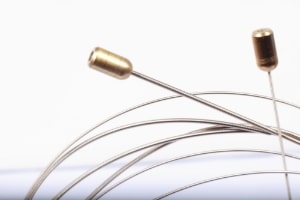
Your Guitar Will Sound Better With New Strings
Generally speaking, a new set of strings will improve the sound of your guitar, especially if it’s an acoustic guitar. New strings always sound “clear and crisp.”
It’s easy to become indifferent to or even overlook what happens to the sound of your strings as they slowly change with continued use. However, people listening in the audience might notice since they are hearing your instrument’s sound for the first time.
Worn-out guitar strings can cause notes to squeak or buzz, especially when playing a fast or difficult song. For more info, see Reduce Guitar String Noise – Make Every Note Sound Awesome!
Sound Clearer When Playing Fast
A string that is “fresh” can produce a clearer tone because it is cleaner, and the geometry of the string is not distorted. This allows it to make better contact with the fret and your finger.
Don’t underestimate the role that string mechanics has in the way you play and sound. For example, fast passages like complex rhythms and solos sound more articulate when played on a fresh set of strings.
Guitarists that are known for playing extremely fast with amazing clarity, like Yngwie Malmsteen, change strings frequently and even change guitar picks during a show. You can see them grabbing new picks that are taped to a microphone stand or the headstock of their guitar, sometimes even in the middle of a song.

You can bet they change their strings multiple times a week and maybe even before each concert. I’m not necessarily recommending this, but it happens more often than you might think.
New Strings Can Stay In Tune Longer
As your strings wear out, they can become harder to keep in tune. This can also affect string intonation, which is the ability to sound in tune in all areas of the neck.
Intonation becomes especially important for “position players.” If you play on just the first four or five frets of the neck, then intonation is less of a problem.
Playing out of tune should always be avoided. In addition to diminishing the quality of your audience’s listening experience, it will adversely affect your ability to train your ear naturally.
Playing in tune will Increase your motivation to practice longer and make you less likely to become discouraged during the learning process, especially during the beginning stages.
For more info, see How To Fix Guitar String Problems – Easy Things You Can Do!
Changing Strings Can Give You More Sustain And Better Harmonics
Newer guitar strings are cleaner, so they vibrate more efficiently and longer when struck. However, as your strings get dirty or less elastic from continuous use or string bending, you will begin to notice that notes will not sustain as long when you hold them.
String vibration also affects string harmonics, even those you don’t play to highlight a passage in a song or solo, like the fundamental harmonic you get when you pluck an open string. So if your guitar starts to sound less dynamic and “one-dimensional,” then it may be that your harmonics are being attenuated.
Electric guitar players, who tend to rely on sustain, note bending, vibrato, and artificial harmonics more than acoustic players, will typically experience string problems sooner.
Frequently Asked Questions About Guitar Strings
Here are the most common questions that beginners and more experienced players ask about their guitar strings.
This information is pretty basic, but it is important to understand and can save you a lot of time and trouble in the long run.
Be aware that opinions may vary on some of these answers. In addition, as you become a more seasoned player, you will develop your own guitar string routines and methodologies.
What Happens When Guitar Strings Get Old?
As your strings get old, they start to show signs of wear and tear, especially if you play the same guitar a lot. Also, if you use metal strings, the surface develops “micro-pits” that can cause premature fret-wear.
Over time, the strings gather debris from the guitar frets and your fingers, like oil, sweat, and skin cells. In addition, the acid in your sweat and oxidization can corrode metal strings.
Nylon strings are resistant to corrosion but can develop a similar set of problems as they age.
What Happens If You Don’t Change Guitar Strings?
Besides causing premature fret-wear, worn-out strings are more likely to break during use, especially if you bend them or use a whammy bar when you play.
If you break a string, you should probably change the entire set unless the strings are new or you don’t have the money. You can always change just the broken string in a pinch and change the rest of them when it becomes more convenient.
Some players never change their strings and only change the ones that break, which I would not ever recommend, especially on an expensive guitar.
How Often Should I Restring My Guitar?
The answer depends on what works best for you. For example, some players routinely change their strings on a fixed schedule, like every two weeks or months. On the other hand, many players wait until their strings look or sound bad.
If you don’t replace your strings routinely, then remember, “when in doubt, change them out!”
How Do I Know If My Guitar Needs New Strings Or “Restringing?”
The more experienced you get, the easier it becomes to decide when to change your strings. Worn-out strings can actually feel “stiff.” Old strings can look “splotchy” due to “string grime,” which you can actually feel and see on your fingers while you play.
Always rub your finger along the underside of the strings when checking for string grime.
If you notice yourself frequently retuning your guitar, you should change your strings before doing anything else, assuming it is not acclimating to an environmental temperature change.
How To Tell If My Guitar Strings Are “Dead.”
“Dead” strings tend to sound dull and muddy, especially on an acoustic guitar. They might be louder in some areas of the neck and softer-sounding in other areas. This is almost invariably from string wear, but in rare cases, you can get a defective string from the factory and sounds dead from the moment you put it on and tune it up.
Should I Change Guitar Strings Myself?
Absolutely! Changing strings is an easy skill to learn, but there is a right and wrong way to change them, which depends to a certain extent on what kind of guitar you have.
It’s important to keep strings from overlapping when you wind them on the tuning machines, or the guitar may not stay in tune, even with new strings.
Electric guitars may string differently than acoustic guitars. Instruments with double locking tremolos are usually the most time-intensive to do string changes. Many videos are available that show you the correct way to install strings for your type of guitar.
How Long Does It Take To Change Guitar Strings?
The more you change strings, the faster you will become. It can typically take anywhere from 15 to 3o minutes to change all six strings. If the guitar neck needs to be cleaned or conditioned before replacing the strings, it can take longer.
It’s definitely worth taking your time and doing it right. I use an Ernie Ball electric string winder, which really speeds things up and makes the job easier.
Can A Broken Guitar String Be Fixed?
Never try to fix a broken guitar string! It’s just not worth it. It takes a lot more time than it’s worth, and you could end up damaging your guitar, which will cost a lot more to fix than buying a new set of strings!
Always try to carry an extra full set of strings in your guitar case. Also, it’s a good idea to carry extra unwound strings (E, B, and G) for quick replacement if you break one while performing, especially if you play professionally.
If money is in short supply, then buy the cheapest set you can find. You can always purchase better strings when you have the money.
How Much Does It Cost To Replace Guitar Strings?
The cost of guitar strings is highly variable, depending on how many you need (6, 7, 12), which strings you buy, where you buy them, and if they are on sale.
If you change strings often, buy them in bulk for an additional discount, but be aware that new strings have a “shelf life.”
I’ve seen a full set sell for under three dollars, while high-tech coated strings can go for as much or more than $12 to $15 for a pack of six.
Generally speaking, it’s better to have a new set of cheaper strings on your guitar than an old set of very worn-out ones.
How Much Does A Single Guitar String Cost?
You can get a high-E string for as little as 50 to 80cents each and cheaper if you buy them in bulk. When it comes to single strings for an emergency replacement, you don’t have to be too fussy. You can always use a cheap one temporarily and replace the entire set at a later date.
How Long Do Guitar Strings Last If Not Played?
Even if you don’t play your guitar, eventually, metallic strings will begin to oxidize, and the corrosion process will begin. Sometimes it’s easier to notice the change if you compare an old unplayed string to a new one of the same type.
Even unopened strings can have an expiration date. Metallic strings can last as long as 3 to 5 years before they oxidize, especially in an air-tight package. On the other hand, Nyon strings can eventually become brittle.
It’s best to buy your strings from somewhere that sells them in high volume to ensure freshness. When in doubt, just put them on your guitar and give them a try!
Is It Bad To Remove All Guitar Strings At Once?
No, not if you are removing all the strings for cleaning or maintenance. However, it can make the job of simply restringing your guitar more difficult and time-consuming. Therefore, for routine string replacement, I recommend removing one string at a time, especially if you have a guitar that has:
- A Floating Tremolo (can be moved both up and down) – it’s typically a lot easier to remove, replace, and retune one string at a time since the bridge plate will move up and down when you do so
- A Floating Bridge (held in place by the downward pressure of the strings) – if the bridge moves out of place it will change the guitar’s intonation
- An ABR Bridge (thumbwheel adjustment is prevented from turning by the downward string pressure) – if the thumbwheels accidentally turn, it will change the guitar’s string action (height from the fingerboard)
If you need to clean the guitar frets and fingerboard, then it’s easier to remove all the strings at once. If you have a floating bridge, I recommend you only remove half the strings at a time (the top three and then the bottom three) to prevent the bridge from moving out of place.
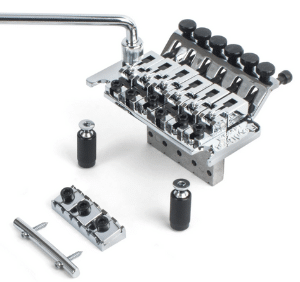
Never remove all the strings from your guitar for an extended period of time if you’re not going to be using it (e.g., for storage). This can cause the guitar neck to wrap (back bow) because it no longer has the strings pulling up on the headstock.
Should I Loosen My Guitar Strings When Not Playing?
No, keep your guitar normally tuned when you are not playing it, which keeps the neck stable and allows you to simply pick it up and play it after a quick check for accurate tuning.
If you plan to store the guitar for about 6 months or longer, you should tune all the strings down a half-step and ensure that it is kept at the proper temperature and humidity, especially if it is an acoustic guitar.
Are Thinner Guitar Strings Easier To Play?
Yes, it makes the strings easier to bend because it takes less string tension to tune them to pitch. However, but be prepared to lose tone and volume. A common solution is to bring the pickups up as high as possible to compensate for the thinner gauge. You should always adjust your pickup height to put them at their “sweet spot,” where they produce the best tone.
I usually don’t like to go below a 0.10 gauge high-E string on my electric solid-body guitars, but I do use 0.09s on occasion. I think 0.08s are too thin, and 0.07s are way too thin.
Back in the 1960s, when I was in high school, I used to play Dan Armstrong 0.07s on my Strat. The thin tone wasn’t that noticeable most of the time because I used a lot of distortion when I played. These days, Billy Gibbons uses 0.07s, and his guitar tone is always “to die for,” so go figure.
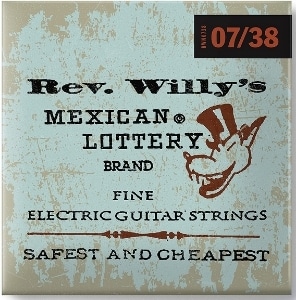
On electric guitars with low-height frets (like Fender vintage frets) and low action, I find it’s easier to bend strings with a 0.10 or larger string set. This can be especially true for guitars with maple fingerboards.
If you change your string gauge, prepare for a guitar neck truss rod and maybe an action adjustment. If you don’t know how to do this, then take your guitar to a qualified technician, or you could permanently damage the guitar neck.
For more info see, Guitar String Gauge Guide – Finding Your New Sound!
Here is a video by Guitar IQ that will give you some additional information on how often you should change your guitar strings and why.
Cleaning Guitar Strings
The other option to changing your guitar strings is to try cleaning them, so they sound and play better. Unfortunately, this frequently gives poor results after the strings have reached their point of no return.
Cleaning works best when you do it each time you play your guitar. If you wait until your strings sound bad, then cleaning them will probably not make much of a difference.
When you clean your strings, it’s important to clean them on top and underneath. You might be surprised how much gook can build up on the bottom of your strings where they contact the frets, especially if your hands sweat a lot when you play.
I have tried all types of string cleaners over the years, but I really like the Dunlop 6582 Ultraglide 65 String Conditioner, which extends the life of strings by preventing tarnish and corrosion.
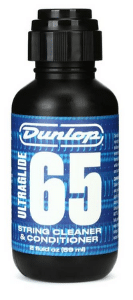
The other product I have used for years is GHS Fast Fret, which is a silicone-free string cleaner and lubricant. Does it really make you play faster? Possibly, because it decreases friction between the strings and your fingers, especially on the wound strings.
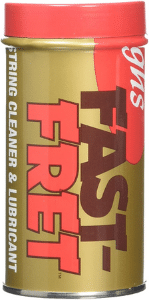
It certainly won’t make you a better player than you already are. The real trick to playing fast and in time is practicing slow and slowly building up speed.
Which Guitar Strings Are “Best?”
I’m asked this question quite frequently. Unfortunately, there is no one correct answer. It depends on many factors and preferences, like:
- The kind of guitar you play (electric, Spanish, classical, etc.)
- The string material (steel, bronze, nylon, etc.)
- The style of music you play (rock, jazz, classical, etc.)
- The string manufacturer
There are so many types and brands of guitar strings that it can be a daunting task to make a selection. In addition, each make and brand of string has its pros, cons, and price range.
If you are taking guitar lessons, you can always have your teacher make a specific string recommendation. Either way, it’s going to require a certain amount of trial and error to find the strings that you like best.
What Guitar Strings Do I Personally Use?
I have used dozens of different types of guitars strings and gauges over the years. My electric solid-body guitars are mostly set up to play rock and blues. My top choices would be Ernie Ball, D’Addario, GHS, and Fender.
I prefer 0.11s (high E string gauge) but they tend to give me wrist pain if I bend them too much so I use 0.10s and sometimes 0.09s. I find the 0.11s give me the best tone but the smaller gauges can sound ok, depending on the guitar and amp.
If I had to choose a single brand, it would be Ernie Ball. I grew up with these strings, and all things being equal, I think they give me the most balanced and consistent sound. So what it really comes down to is whatever works for you.
Here are some of the artists who use Ernie Ball Strings, listed on the back of each package. It reads like a “guitar player whos who.”
Eric Clapton, Jimmy Page, Paul McCartney, Keith Richards, Slash, Jeff Beck, Pete Townshend, Buddy Guy, Angus Young, Steve Vai, Ronnie Wood, Joe Perry, John Petrucci, Steve Morse, John Mayer, Steve Lukather, Kirk Hammett, James Hetfield, Joe Bonamassa, Albert Lee, Joe Walsh, Mick Mars, The Eagles, John Fogerty, Elvis Costello, Brad Paisley, Paul Stanley, Johnny Marr, Billie Joe Armstrong, Iron Maiden, Weezer, Matt Bellamy, The Strokes, Avenged Sevenfold, Fall Out Boy,
Dropkick Murphys, Kid Rock, Los Lobos, Alt-J, Tom Dumont, Bullet For My Valentine, MxPx, Jeff Loomis, Panic! At The Disco, MGMT, New Found Glory, Escape The Fate, Pierce The Veil, Eagles of Death Metal, Incubus, System Of A Down, Ilan Rubin, Steve Stevens, The Lumineers, Breaking Benjamin, Cage The Elephant, Mac DeMarco, The Descendents, Butch Walker, Dr. Dog, All That Remains, Death From Above 1979, All Time Low, A Day To Remember, Tony MacAlpine, Alice, Of Mice & Men, Silversun Pickups, Jason Richardson, Lissie, Sleeping with Sirens, Florida Georgia Line, Daniel Donato, George Ezra, PVRIS, The Wombats, Alkaline Trio, Parkway Drive, Twin Shadow, Falling In Reverse, Every Time I Die, Walk The Moon, Wolfmother, Conor Oberst,
Iration, Lagwagon, The Offspring, Marilyn Manson, St. Vincent, Hunter Hayes, Nine Inch Nails, Blink-182, Rise Against, Glenn Tipton, Tool, A Perfect Circle, AFI, Paul Gilbert, Tom DeLonge, Kenny Wayne Shepherd, Kurt Vile, Social Distortion, Bad Religion, Dierks Bentley, Kenny Chesney, Maroon 5, Papa Roach, Thrice, Andy McKee, Sublime with Rome, Albert Lee, Pennywise, NOFX, Seether, Sum 41, Billy Talent, Sully Erna, At The Drive-In, Billy Duffy, Dhani Harrison, Clay Cook, Flogging Molly, Dave Navarro, 311, Robert Smith, Jimmy Eat World, Courtney Barnett, Frank Turner, J Mascis,
Rascal Flatts, Dirty Heads, The White Buffalo, Bring Me The Horizon, Chris Broderick, Bush, Nickelback, Darius Rucker, Clint Black, Atlas Genius, Phantogram, Phoenix, Best Coast, Big Data, The 1975, AWOLnation, Deap Vally, The War On Drugs, Manchester Orchestra, The Gaslight Anthem, Wolf Jared Dines, Rob Chapman, Charlie Parra, Ryan “Fluff” Bruce, Cold, The Devil Makes Three, The Melvins, Reignwolf, Face to Face, Beartooth, Jason Isbell, Gojira, Rick Springfield, and thousands more.
What To Read Next ➡ Why Light Gauge Guitar Strings Break Easier: The Full Story!
Related Article ➡ Coated Vs Uncoated Guitar Strings – Which One Is Better?
Final Thoughts On “Why Change Guitar Strings”

Keeping your guitar in top playing condition is important to get the best sound and most enjoyment out of your instrument. One of the most basic things you can do to make it sound great is changing your strings regularly.
Some players never change strings until they break. I had the honor of seeing Albert Collins play many years ago in a small club. During his set, he broke a string, and after he finished the song, he took a break to replace it.
I was right up in front and saw him pull a “rusty-looking” coiled up, bent string out of the back of his amp. I couldn’t believe how dirty-looking it was, but he strung it up in a flash and continued to play! But, of course, he was an incredible guitar player, so I guess improving his sound quality by using fresh strings never occurred to him.
To learn more about Albert Collins, see Best Telecaster Players – These Tele Masters Will Shock You!
You should also check out Replacing Guitar Strings If One Breaks – Replace Them All?
Strings come in a wide variety of gauges, materials, and winding types. Finding the strings that work best for you takes experience and a bit of trial and error. Always be sure to use the proper type of strings for your guitar.
To help extend the life of your strings, use a good string cleaner after each time you play your guitar. Then, keep it readily available in your guitar case or next to your guitar stand.
For more info, check out Why Is My Guitar Tone So Bad? -Massively Improve Your Sound!
What To Read Next ➡ How Hard To Pick Guitar Strings? Transforming Your Sound!
Related Article ➡ How Long Do Guitar Strings Last? Must-Know Facts & Secrets!
What To Read Next ➡ How To Prevent Electric Guitar Strings From Rusting: 5 Tips!
Tell Me What You Think

Please let me know what’s on your mind in the comment section, or if I can help you with anything.
- Do you have any additional tips or suggestions on changing guitar strings?
- What brand of strings do you use on your guitar?
- What kind of guitar do you have, and what gauge strings do you use?
- How often do you change electric guitar strings or changing classical guitar strings?
- Have you tried many types of strings, or have you always uses the same brand?




Hey Frank, what an awesome article! This is something that guitar owners should consider when investing in a guitar. This article has a lot of helpful tips and advice so beginners will have minimal setbacks in their practice. I’ve had to change guitar strings a few times after noticing that something wasn’t quite right with the sound. What has your experience been with changing guitar strings?
Hi, Gabriel
Thank You for your comments!
I’m glad you enjoyed the article, and I hope you find it helpful.
I change strings on my guitars routinely, and anytime a guitar is giving me a problem with tuning, intonation, or the sound quality is “off.” My strings never get to the point where they actually “look dirty” because I clean them after each use. I have many guitars, so strings seem to last longer since I’m always playing a different one. Still, as strings age, they oxidize and lose tone, even if the guitar is not being used.
So, “when in doubt, change them out!”
Frank
Great article! I must admit that I love music and I play quite well the piano for fun. I tired to learn to play guitar, but I guess it was too hard for me. I envy some of my friends who can play well the piano and guitar. I will share this article to my friends who plays guitar, I’m sure it will be useful for them. Thanks for sharing!
Hi, David
Thank You for your comments!
If you can play the piano, then you can also play the guitar. It may take you a little longer to progress on the guitar, but it’s just a matter of putting in the time required to learn the basics. Sometimes, taking a few guitar lessons to get you moving in the right direction can be quite helpful.
I highly recommend you give it another try! 😊🎸
Frank